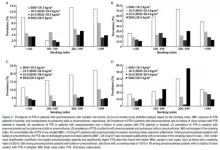(Press-News.org) Alex Zhavoronkov, PhD, a pioneer of generative artificial intelligence (AI) for biology and chemistry, and founder and CEO of Insilico Medicine (“Insilico”) will present at the Lab of the Future Congress at the Renaissance Boston Waterfront Hotel on March 9, 2pm ET.
In a talk titled “Novel Target Discovery and Molecular Design Using AI,” Dr. Zhavoronkov will share the breakthroughs and discoveries that have made Insilico Medicine a leader in generative AI drug discovery. This includes the development of Insilico’s end-to-end Pharma.AI platform for identifying novel targets (PandaOmics), designing new drugs (Chemistry42), and predicting the outcomes of clinical trials (InClinico). Also, how Insilico is partnering with top pharma companies like Fosun Pharma and Sanofi to advance their programs. Insilico is working with Fosun Pharma on IND-enabling studies to advance PCCs in the anti-cancer QPCTL program to clinical trials, and signed its largest partnership deal to date with Sanofi, a strategic research collaboration worth up to $1.2B, last year.
Dr. Zhavoronkov will also share progress on Insilico’s internal pharmaceutical pipeline. The Company’s lead drug for the devastating chronic lung disease idiopathic pulmonary fibrosis (IPF), the first AI-discovered and AI-designed drug to advance to clinical trials, will soon be entering Phase 2 trials with patients. And Insilico recently announced that its generative AI-designed drug for COVID-19 and related variants has been approved for clinical trials and offers a number of design advantages over existing COVID-19 drugs.
There are an additional 30 drugs in Insilico’s internal pipeline available for partnering and licensing for indications including cancer, fibrosis, and immunology.
Lab of the Future brings together hundreds of life science research leaders for the best attended congress on the future of biopharma R&D around the topics of innovation, collaboration and technology. The event is hosted by Open Pharma Research, which is dedicated to driving progress in the creation of a strategic and operational framework that allows scientists the freedom to innovate.
Founded in 2014, Insilico Medicine has raised over $400m in funding to date from notable biotech and tech investors and has won numerous awards, including, in 2022, the BioCentury-BayHelix Company of the Year award and Top 100 AI Companies by CB Insights.
About Insilico Medicine
Insilico Medicine, a clinical stage end-to-end artificial intelligence (AI)-driven drug discovery company, is connecting biology, chemistry, and clinical trials analysis using next-generation AI systems. The company has developed AI platforms that utilize deep generative models, reinforcement learning, transformers, and other modern machine learning techniques to discover novel targets and to design novel molecular structures with desired properties. Insilico Medicine is delivering breakthrough solutions to discover and develop innovative drugs for cancer, fibrosis, immunity, central nervous system diseases and aging-related diseases. Headquartered in Hong Kong, Insilico Medicine has additional offices in New York, Montreal, Shanghai, Suzhou, Taipei, and Abu Dhabi. www.insilico.com
For media inquiries, please contact media@insilicomedicine.com
For business development, please contact bd@insilicomedicine.com
END
Insilico Medicine’s Generative AI Pioneer Alex Zhavoronkov, PhD at Lab of the Future March 9
2023-03-01
ELSE PRESS RELEASES FROM THIS DATE:
Review of studies finds disparity in presumptive chlamydia and gonorrhea treatment rates despite CDC guidelines
2023-03-01
INDIANAPOLIS – A Regenstrief Institute-led review of studies on proactive health services for chlamydia and gonorrhea has found that rates of presumptive treatment -- antibiotics prior to laboratory test confirmation -- varies widely.
The U.S. Centers for Disease Control and Prevention recommends presumptive treatment of individuals with symptoms of or known contact with these infections to decrease likelihood of secondary infections as well as poor outcomes.
The healthcare settings of all 18 of the studies reviewed were within the U.S. and patients were age 14 and older. Presumptive treatment rates were found to ...
Chinese Medical Journal study identifies major risk factors of pulmonary tuberculosis in patients with pneumoconiosis in China
2023-03-01
Pneumoconiosis comprises a group of heterogeneous lung diseases resulting from the inhalation of mineral dust. It is an occupational hazard with significant economic and social implications. Notably, patients with pneumoconiosis have an elevated risk of contracting pulmonary tuberculosis (PTB). Unfortunately, pneumoconiosis has a strong presence in China. However, extensive population-based studies on the prevalence of PTB in patients with pneumoconiosis have not been conducted in China since almost three decades.
To bridge this gap, a team of ...
National Comprehensive Cancer Network updates annual conference with new in-person venue, hybrid format, expert-led sessions, highlighted research perspectives, and small-group conversations
2023-03-01
PLYMOUTH MEETING, PA [March 1, 2023] — The National Comprehensive Cancer Network® (NCCN®) today announced the NCCN 2023 Annual Conference will debut a new hybrid format, including in-person events at a new venue. This marks the first time in three years that this premier oncology meeting will be held in-person, and the first-ever time at the Orlando World Center Marriott, starting on March 31.
“We’ve heard from many people who learn better by being in the ‘room where it happens,’” said Robert W. ...
Moose can play a big role in global warming
2023-03-01
One of the biggest potential single sources of carbon emissions from wooded parts of Norway has four legs, weighs as much as 400-550 kg and has antlers.
That’s right — moose can reduce carbon storage in clearcut sites equivalent to as much as 60 per cent of the annual fossil fuel carbon emissions from a region, a new study shows.
“Moose are an ecosystem engineer in the forest ecosystem, and strongly impact everything from the species composition and nutrient availability in the forest,” said Gunnar Austrheim, an ecologist at the NTNU University Museum who was one of the study’s co-authors. “A grown animal can eat 50 kilograms ...
America on the move: How urban travel has changed over a decade
2023-03-01
A new Florida Atlantic University study on America’s urban travel trends shows important variations in travel behaviors across income, home ownership, ethnicity, gender, age, and life-cycle stages. The sixth in a series of studies compared changes in travel modes, trip frequency, trip distance and vehicle ownership among a range of socioeconomic groups using nationwide travel survey data since 1977.
The most notable trend, published in the journal Transportation Research Part D, reveals that although private automobiles continue to be the dominant travel mode in American cities, the share of car trips has slightly and steadily decreased ...
JAMA Network names new editor in chief of JAMA Internal Medicine
2023-03-01
Chicago, March 1, 2023 — Sharon K. Inouye, M.D., M.P.H., Professor of Medicine at Harvard Medical School and the Milton and Shirley F. Levy Family Chair and Director of the Aging Brain Center, Marcus Institute for Aging Research at Hebrew SeniorLife has been named the editor in chief of JAMA Internal Medicine.
An internationally recognized leader in internal medicine, geriatrics, and aging research, Dr. Inouye’s research focuses on delirium and functional decline in hospitalized older patients. She is currently the overall principal investigator of the Successful Aging after ...
Chemotherapy alters immune cell landscape in pancreatic cancer
2023-03-01
Chemotherapy affects the ability of a patient’s immune system to attack pancreatic tumors, a new study shows.
Led by researchers at NYU Langone Health and its Perlmutter Cancer Center, the work revolves around the immune system, which includes T cells designed to attack foreign organisms like viruses. To spare normal cells, the system uses “checkpoint” molecules like PD1 on T cell surfaces to turn off their attack when they receive the right signals. The body also recognizes tumors as abnormal, but cancer cells ...
Dutch healthcare system isn't prepared for pregnant transgender men
2023-03-01
Transgender men can, and often wish to, become pregnant. However, they do need extra guidance and care providers often lack the necessary knowledge and skills. Amsterdam UMC is the first to conduct qualitative research into the experiences of Dutch transgender people with maternity care. This research is now avaliable as a pre-print in Midwifery.
Transgender men often undergo medical procedures to adjust their bodies to their male gender identity. These medical interventions can affect fertility. Some transgender men therefore choose not to undergo these treatments, postpone them or, even, to temporarily stop them. ...
Study shows those with a higher omega-3 index are more protected from severe COVID infection
2023-03-01
A study just published in the American Journal of Clinical Nutrition (AJCN) explored the role of omega-3 fatty acids, especially EPA and DHA, and whether they might be protective against contracting and/or suffering adverse outcomes of COVID-19 infection.
The study compared the risk for three COVID-19 outcomes: 1-testing positive, 2-hospitalization, and 3-death as a function of baseline plasma DHA levels.
DHA levels (% of total fatty acids) were measured by Nuclear Magnetic Resonance (NMR) spectroscopy but were converted to Omega-3 Index (red blood ...
Degrading modified proteins could treat Alzheimer’s, other ‘undruggable’ diseases
2023-03-01
Certain diseases, including Alzheimer’s, are currently considered “undruggable” because traditional small molecule drugs can’t interfere with the proteins responsible for the illnesses. But a new technique that specifically targets and breaks apart certain proteins — rather than just interfering with them — may offer a pathway toward treatment. Researchers reporting in ACS Central Science have, for the first time, designed a compound that targets and breaks down a posttranslationally modified protein closely associated with Alzheimer’s disease.
Researchers have been exploring targeted protein degradation (TPD) as a way to get at ...





